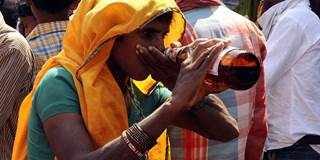In a country where the national hero is the saintly Mahatma Gandhi, who considered alcohol an unmitigated evil, drinking has always carried a whiff of disrepute – one that has led to repeated attempts to implement prohibition. But Indians' penchant for moralizing has often carried heavy economic and human costs.
NEW DELHI – Last month, 18 people in the Gopalganj district of India’s Bihar state died after consuming illicit alcohol, highlighting – once again – the peculiar relationship between morality and tragedy in India. The victims were poisoned because this April, in a fit of moralism, Bihar adopted a draconian law prohibiting the sale, possession, and consumption of alcohol. It is far from the first such ban that has ended badly.
In a country where the national hero is the saintly Mahatma Gandhi, who considered alcohol an unmitigated evil, drinking has always carried a whiff of disrepute. India’s constitution, in its non-enforceable Directive Principles, urges Indians to work toward prohibition, and the government does not serve alcohol even at state banquets and official receptions. Four out of 29 Indian states (Bihar, Gujarat, Manipur, and Nagaland) and one union territory (Lakshadweep or the Laccadive Islands) are currently attempting to enforce total prohibition.
But maintaining a sweeping prohibition policy has long proved difficult in India. In Manipur in 2002, the 1991 ban was lifted in five hill districts, where alcohol consumption is a centuries-old local tradition. Lakshadweep makes an exception for an uninhabited island, where a tourist resort is allowed to operate a bar. When I was a child, what was then Bombay excused anyone with a doctor’s note confirming alcoholism. (Well-heeled executives tripped over themselves to be labeled alcoholics.)

NEW DELHI – Last month, 18 people in the Gopalganj district of India’s Bihar state died after consuming illicit alcohol, highlighting – once again – the peculiar relationship between morality and tragedy in India. The victims were poisoned because this April, in a fit of moralism, Bihar adopted a draconian law prohibiting the sale, possession, and consumption of alcohol. It is far from the first such ban that has ended badly.
In a country where the national hero is the saintly Mahatma Gandhi, who considered alcohol an unmitigated evil, drinking has always carried a whiff of disrepute. India’s constitution, in its non-enforceable Directive Principles, urges Indians to work toward prohibition, and the government does not serve alcohol even at state banquets and official receptions. Four out of 29 Indian states (Bihar, Gujarat, Manipur, and Nagaland) and one union territory (Lakshadweep or the Laccadive Islands) are currently attempting to enforce total prohibition.
But maintaining a sweeping prohibition policy has long proved difficult in India. In Manipur in 2002, the 1991 ban was lifted in five hill districts, where alcohol consumption is a centuries-old local tradition. Lakshadweep makes an exception for an uninhabited island, where a tourist resort is allowed to operate a bar. When I was a child, what was then Bombay excused anyone with a doctor’s note confirming alcoholism. (Well-heeled executives tripped over themselves to be labeled alcoholics.)